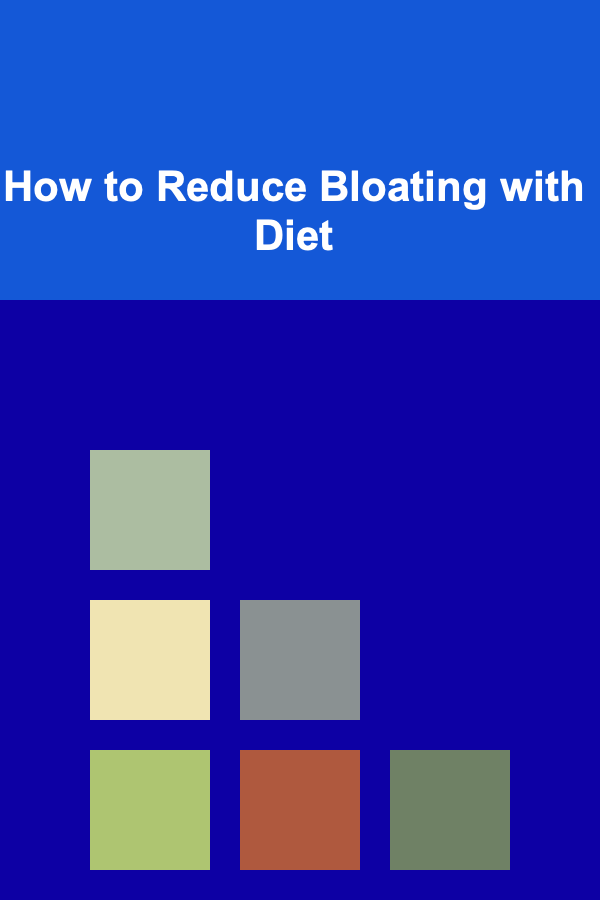
How to Reduce Bloating with Diet
ebook include PDF & Audio bundle (Micro Guide)
$12.99$9.99
Limited Time Offer! Order within the next:

Bloating is a common issue that many people face on a daily basis. It can make the stomach feel swollen, uncomfortable, or even painful. Although bloating can result from several different causes, one of the most common reasons is dietary choices. What you eat and how you eat can play a significant role in reducing bloating. This article will explore how diet affects bloating and provide practical tips for managing and reducing bloating through mindful dietary changes.
Understanding Bloating
Before we dive into dietary solutions, it's essential to understand what bloating is. Bloating refers to a sensation of fullness or distention in the abdomen. It is usually caused by the accumulation of gas in the digestive system or the retention of fluids. The sensation can range from mildly uncomfortable to severely painful, and it often leads to visible swelling of the stomach.
Bloating can occur for a variety of reasons, including:
- Excessive gas production: This can happen when food is not fully digested and ferments in the intestines, producing gas.
- Fluid retention: Hormonal changes, high sodium intake, or other factors can cause your body to retain water.
- Food intolerances and allergies: Some foods can trigger bloating, especially for those who have sensitivities to lactose, gluten, or certain FODMAPs (fermentable oligosaccharides, disaccharides, monosaccharides, and polyols).
- Slow digestion: A sluggish digestive system can cause food to linger longer in the stomach and intestines, leading to bloating.
Now that we know what causes bloating, let's explore how to reduce bloating through diet.
Key Dietary Changes to Reduce Bloating
1. Identify and Avoid Trigger Foods
Certain foods are notorious for causing bloating, especially when consumed in large quantities or by people who are sensitive to them. The first step in reducing bloating is identifying and avoiding these trigger foods. Some common culprits include:
High-FODMAP Foods
FODMAPs are short-chain carbohydrates that are poorly absorbed in the small intestine, leading to fermentation and gas production in the gut. Many people experience bloating as a result of consuming high-FODMAP foods. The main groups of FODMAPs include:
- Oligosaccharides: Found in foods like wheat, onions, and garlic.
- Disaccharides: Found in dairy products, particularly milk, which contains lactose.
- Monosaccharides: Found in fruits like apples, pears, and mangoes, which contain high levels of fructose.
- Polyols: Found in foods like cherries, mushrooms, and artificial sweeteners.
Eliminating or reducing high-FODMAP foods from your diet may significantly reduce bloating. However, it is important to consult with a healthcare professional before making drastic changes to your diet.
Carbonated Beverages
Soda, sparkling water, and other carbonated beverages can introduce excess air into the digestive system, which contributes to bloating. Even though these drinks might seem refreshing, they can be a major source of discomfort, especially if consumed in large quantities. Opting for still water or herbal teas is a great way to stay hydrated without the risk of bloating.
Dairy Products
For individuals with lactose intolerance, dairy products can be a significant source of bloating. The inability to digest lactose properly can lead to gas, cramping, and bloating. If you're lactose intolerant, switching to lactose-free dairy products or plant-based alternatives like almond milk or coconut yogurt can alleviate these symptoms.
Processed Foods
Processed foods are often high in sodium, which can lead to fluid retention and bloating. Many canned soups, fast food, and frozen meals are packed with salt, and consuming too much sodium can cause the body to hold onto water. Reducing your intake of processed foods and opting for fresh, whole foods will help prevent bloating caused by excess sodium.
2. Increase Fiber Intake Gradually
Fiber is a key component of a healthy diet, and it plays an essential role in digestion. It helps to regulate bowel movements, reduce constipation, and keep the digestive system functioning properly. However, a sudden increase in fiber intake can lead to bloating and gas, especially if your body isn't used to it. To reduce bloating from fiber, it's important to gradually increase your intake.
Soluble vs. Insoluble Fiber
There are two types of fiber: soluble and insoluble. Soluble fiber absorbs water and forms a gel-like substance in the gut, which can help slow digestion and prevent bloating. Insoluble fiber, on the other hand, adds bulk to the stool and helps promote regular bowel movements. While both types of fiber are important for gut health, individuals who are prone to bloating may benefit from focusing on soluble fiber sources, such as oats, apples, and beans, and limiting insoluble fiber, found in foods like wheat bran, carrots, and celery.
3. Stay Hydrated
Water is essential for maintaining proper digestive function and preventing bloating. Dehydration can slow down the digestive process, leading to constipation and bloating. Additionally, drinking plenty of water can help flush out excess salt and reduce water retention in the body.
To stay properly hydrated, aim for at least 8 cups (about 2 liters) of water per day. You can also include herbal teas such as peppermint or ginger tea, which can help reduce bloating and soothe the digestive tract.
4. Focus on Small, Frequent Meals
Eating large meals can overwhelm your digestive system, leading to bloating and discomfort. Instead, try eating smaller, more frequent meals throughout the day. This approach can help your digestive system process food more efficiently and prevent the buildup of gas in the stomach.
Additionally, eating slowly and chewing your food thoroughly allows the digestive enzymes in your mouth to break down food before it reaches the stomach, which can further reduce bloating. Avoid eating on the go or when stressed, as these habits can lead to overeating and indigestion.
5. Incorporate Digestive Enzyme-Rich Foods
Certain foods naturally support digestion and can help reduce bloating. These foods contain digestive enzymes that assist in breaking down food more effectively, making it easier for the body to absorb nutrients without excess gas or discomfort. Some examples of digestive enzyme-rich foods include:
- Pineapple: Contains bromelain, an enzyme that helps break down proteins in the stomach.
- Papaya: Contains papain, another enzyme that aids in protein digestion.
- Ginger: Known for its anti-inflammatory properties, ginger can also help soothe the digestive tract and reduce bloating.
Incorporating these foods into your diet can help promote digestion and alleviate bloating.
6. Manage Stress Levels
Stress can significantly impact digestion and contribute to bloating. When you're stressed, your body releases hormones that can slow down the digestive process, leading to bloating and discomfort. Additionally, stress can cause you to swallow more air, which can lead to gas buildup in the stomach.
Managing stress through relaxation techniques such as deep breathing, yoga, meditation, or mindfulness can help improve digestion and reduce bloating. Regular physical activity also helps to reduce stress and promote gut health.
7. Include Probiotic-Rich Foods
Probiotics are beneficial bacteria that support gut health by promoting a healthy balance of microbes in the digestive system. A balanced gut microbiome can help prevent bloating caused by imbalances in gut bacteria. Probiotic-rich foods can include:
- Yogurt: Choose varieties with live active cultures.
- Kefir: A fermented milk drink that's rich in probiotics.
- Sauerkraut and kimchi: Fermented vegetables that contain beneficial bacteria.
Including these foods in your diet can help support healthy digestion and reduce bloating over time.
8. Avoid Artificial Sweeteners
Artificial sweeteners such as sorbitol, mannitol, and xylitol are commonly found in sugar-free products, including gum, candy, and drinks. These sweeteners can cause bloating and gas in some people, as they are not fully absorbed by the body and ferment in the gut. If you're prone to bloating, it's best to avoid foods and drinks containing artificial sweeteners.
9. Consider the Timing of Your Meals
When you eat is just as important as what you eat. Eating late at night or just before bed can lead to bloating, as the digestive system may not function as efficiently while you sleep. To reduce bloating, aim to finish eating at least 2-3 hours before bedtime. This allows your body enough time to digest food before you lie down, preventing discomfort during the night.
10. Monitor Portion Sizes
Overeating is one of the leading causes of bloating. Large portion sizes can overwhelm the digestive system, making it harder for the body to break down food efficiently. To avoid this, try monitoring your portion sizes and avoid eating until you feel stuffed. Eating mindfully and listening to your body's hunger cues can help prevent overeating and reduce bloating.
Conclusion
Bloating is a common and often uncomfortable condition that can be caused by a variety of factors, including dietary choices. By making informed changes to your diet, such as avoiding trigger foods, increasing fiber intake gradually, staying hydrated, eating smaller meals, and incorporating digestive-friendly foods, you can significantly reduce bloating and improve overall gut health. Remember, each body is different, so it's important to pay attention to how your body responds to different foods and adjust your diet accordingly. If bloating persists or is accompanied by other symptoms, it's always best to consult with a healthcare professional to rule out any underlying health conditions.

How to Build a Crisis Management Checklist for Crisis Simulations and Drills
Read More
How to Build a Passive Income Portfolio Using Deep Learning
Read More
How to Make Money Online as a Decluttering Consultant: 10 Actionable Ideas
Read More
How to Make Money Online as a Stock Photographer: 10 Actionable Ideas
Read More
How to Use Color-Coded Storage for Different Crafts
Read More
How to Use Vintage Jars for Stylish Organization
Read MoreOther Products

How to Build a Crisis Management Checklist for Crisis Simulations and Drills
Read More
How to Build a Passive Income Portfolio Using Deep Learning
Read More
How to Make Money Online as a Decluttering Consultant: 10 Actionable Ideas
Read More
How to Make Money Online as a Stock Photographer: 10 Actionable Ideas
Read More
How to Use Color-Coded Storage for Different Crafts
Read More